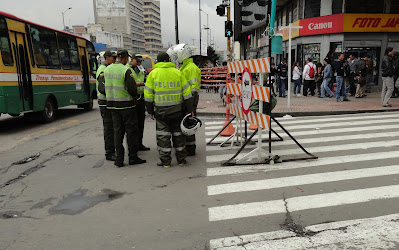Ireland’s been on our minds here recently.
Not in a fond way, but in that typical lamentable style that as a tribe we seem
to have perfected.
Distance and personal distractions had kept the homeland’s
myriad of problems more or less out of our immediate thoughts. That changed
though after a Skype chat with an old friend – another of the many Irish abroad
– who informed us of an excellent article, Off to New York with the iPaddies on the Irish
Times' ‘Generation Emigration’ blog.
 |
| 'Taking flight' - The Irish on the move en masse once more. |
Cutting the Celtic Tiger's claws
Of course, the picture painted in that
particular piece isn’t something that will shock many Irish people –
considering what’s happened in the last few years, we’re pretty much
shock-proof these days.
What is worrying, though, particularly for us, the younger
generation, is the way that people who experienced the pre-Celtic Tiger lean
years, see the current situation as much, much worse.
When you look at the context, however, the widely accepted fact that things will be as bad as ever for the Free State is pretty logical really.
When you look at the context, however, the widely accepted fact that things will be as bad as ever for the Free State is pretty logical really.
Before we look at that context, it
must be said that politicians and others who were quick to take credit for our
economic expansion cannot simply shun culpability for their part in aiding our
dramatic collapse. In any case, their role in both events was superficial.
In simplified summation, the Republic’s
‘rise’ was an inevitable consequence of its largely unavoidable decision to
open its doors to the free market. Had the state not done so, we risked becoming
the Western equivalent of North Korea.
So after years of economic isolation, we
went from a subsistence existence to a country that could, relatively speaking,
compete on the world stage. And we were, up until the late 1990s, an
attractive place to do business for money-spinning multinationals.
Wage demands were relatively low compared to other Western countries. We had agreeable tax rates and a laissez-faire political attitude to big business.
Wage demands were relatively low compared to other Western countries. We had agreeable tax rates and a laissez-faire political attitude to big business.
Coupled with this, the availability of cheap money (at the time) from our
European neighbours – a result of our decision to join the EU and later the
European Monetary Union – meant we could push ahead with much-needed
infrastructural development which thus provided massive employment in the construction sector, a natural phase for an emerging country to go through.
Inevitably, though, with so much money flying about the country, everybody
wanted a greater slice of the cake. So wage and welfare demands increased and
we gradually became a less attractive place for outsiders to do business in.
Now, if you happen to be a country with vast
natural resources that can survive without huge outside investment in a
free-market world, then that’s fine. But we’re not.
Thus, by becoming a more
expensive place to do business, our clients looked elsewhere. And with the
massive technological advancement in the last thirty years, the strategic
importance that we once had as a ‘smart economy’, English-speaking nation on the
threshold of the European market for US and other multinational companies
became less relevant.
Throw into the mix a global recession and the result is
what we have today. All unavoidable really.
So what can be done?
Well, as much as our
‘esteemed’ leaders try to tell us differently, emigration is one solution. It
was said, apparently, that in the 1980s Ireland could only sustain
one-in-every-two people born on the island. So if things are far worse now than
compared to 30 years ago, as most say they are, then the current rapid flow of
emigration must continue.
That aside, there are obviously still cosy jobs for some people in Ireland. It’s not all doom and gloom for a
number who stay put.
However, as a country where emigration is in our blood,
many compatriots through the ages who had any ‘get up and go’ did just that
and left. And for plenty of these, they realised potential in another land that
they perhaps never would have if they had remained at home.
 |
| While many Irish may be 'struggling', it's all relative. |
On a slightly less serious note, alongside
the suggestions we had in ‘South American Solutions to Irish Problems',
another in the same category was given to us by a good friend.
His ‘solution’
is to give those who remain in the state about €1million to leave and when
they have, plant the whole country. A cheaper option, he reckons, than trying to
pay back our debts. And a ‘greener’ one at that.
One thing worth remembering, though, is this.
No matter how bad we think things are, there are people in other parts of the
world who have it far worse. These are people who, if they manage to wake up
in the morning, are not sure if they will survive the day.
For the majority of Irish people, struggling as we may be, such a life-or-death scenario is something we don’t have to face.
For the majority of Irish people, struggling as we may be, such a life-or-death scenario is something we don’t have to face.








